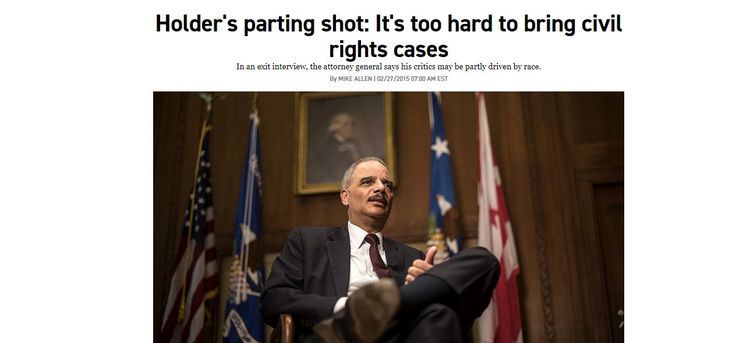
Eric Holder Calls "For a Lower Standard of Proof for Civil Rights Crimes"
By Steve Sailer
02/27/2015
From Politico:
Eric Holder’s parting shot: It’s too hard to bring civil rights cases
In an exit interview, the attorney general says his critics may be partly driven by race.
By MIKE ALLEN 2/27/15 7:00 AM EST
Attorney General Eric Holder plans to push, during his final weeks in office, a new standard of proof for civil-rights offenses, saying in an exit interview with POLITICO that such a change would make the federal government “a better backstop” against discrimination in cases like Ferguson and Trayvon Martin.
Holder could look outside the mainstream of Anglo-Saxon jurisprudence to more informal community-based systems of legal reasoning, such as lynch law.
Holder told POLITICO that between now and his departure, probably in early March when the Senate is expected to confirm Loretta Lynch as his successor
They could call it Lynch law.
he will call for a lower standard of proof for civil rights crimes.
For example, consider the old rationalization for punishing an innocent man: For Reason of State. Isn’t it about time that the Obama Administration becomes entitled to arbitrarily imprison cisgender straight white males For Reason of Narrative?
Such a change would make it easier for the federal government to bring charges in the case of a future Ferguson or Trayvon Martin.
Guilty by reason of uppitiness!
“I think some serious consideration needs to be given to the standard of proof that has to be met before federal involvement is appropriate, and that’s something that I am going to be talking about before I leave office,” Holder, 64, said.
If security camera footage shows the convenience store was looted by at least twelve good men and true, that should constitute a legal indictment of any white cop under federal civil rights laws.
The attorney general’s comments appeared to be aimed partly at preparing the country for the possibility that no federal charges would be brought in the death of Michael Brown in Ferguson, Mo., last summer.
 Graffiti reading “Snitches get stitches” would be admissible as evidence that the shopkeeper had it coming.
Graffiti reading “Snitches get stitches” would be admissible as evidence that the shopkeeper had it coming.
Holder said the inquiry would be completed when he left office, expected around the second week of March.
The Justice Department announced Tuesday that the Martin investigation had been closed, with “insufficient evidence to pursue federal criminal civil rights charges” against George Zimmerman, the neighborhood watch coordinator who shot the unarmed black teenager to death back in 2012.
Asked if the bar for federal involvement in the civil rights offenses is too high for federal prosecutors to make cases in shootings like those of Martin and Brown, Holder suggested it was.
Trial by Twitter would be one reform that deserves serious consideration.
“I think that if we adjust those standards, we can make the federal government a better backstop — make us more a part of the process in an appropriate way to reassure the American people that decisions are made by people who are really disinterested,” he said.
You can’t get much more disinterested than the Obama Administration over Trayvon in the run-up to the 2012 Election: “You know, when Trayvon Martin was first shot I said that this could have been my son. Another way of saying that is Trayvon Martin could have been me 35 years ago.”
“I think that if we make those adjustments, we will have that capacity.”
For example, if a random white person in the metropolitan area gets beaten to death with hammers within a few weeks of a white cop being let off by the judicial system, that show of community concern should legally override the white man’s outmoded Constitutional immunity from double jeopardy.
Lawyers in the Justice Department are looking into various possible reforms of civil rights law.
For example, the federal government could prosecute white people based on a sophisticated metric consisting of a case’s column inches of coverage in The New York Times multiplied by the number of miles from the New York Times Building on 8th Avenue.
Depending on their determination, it’s possible that Holder will simply argue about the need for a lower standard of proof rather than propose a specific legislative remedy.
For example, indicting people based on Facebook Likes and Dislikes would be a disruptive approach to the hidebound judicial system.
Possible changes include toughening hate-crimes laws, which were under consideration in the Martin case, and establishing a broader standard for what constitutes a “deprivation of rights under color of law,” the provision that could apply to the police shooting in Ferguson.
Another reform would be to remove pedantic pre-postmodern technicalities about the white malefactor needing to actually “exist,” thus allowing the Obama Administration the moral satisfaction of indicting Haven Monahan.
